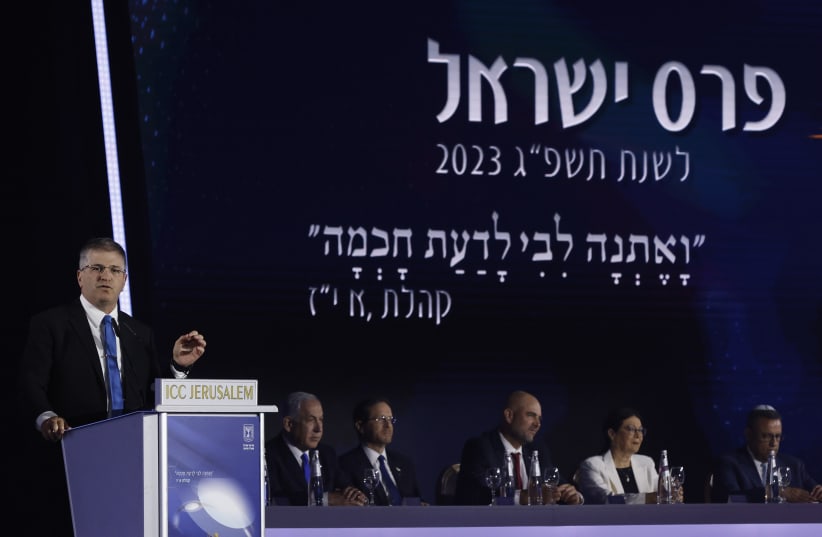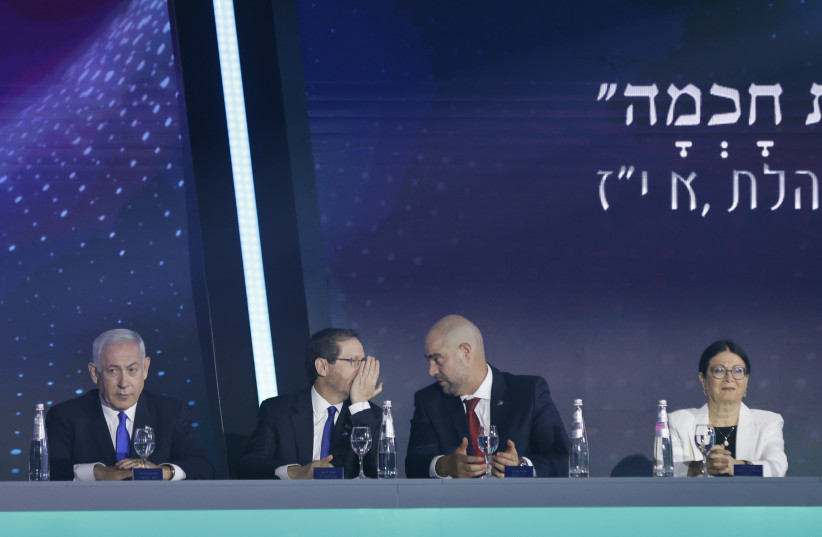Mobileye founder Prof. Amnon Shashua, Rabbanit Rachel Haber and Druze social activist Amel Nasraldin received the Israel Prize for Lifetime Achievement at a festive ceremony on Wednesday evening.
The ceremony was hosted by Ofer Hadad and Lital Shemesh.
After receiving the award, Shashua said: "I learned that the commonality that unites us all exceeds what separates us. These are difficult days in Israel, for all of us, and we are facing a deep divide. This is our urgent task now, we must join forces and resolve the current crisis, while strictly observing the principle of separation of powers: the legislative, the executive and the judicial, so that we don't lose everything we've achieved." Shashua stressed that "if we don't do this, even miracles won't help."
Education Minister Yoav Kish stated during the ceremony that "It is good that we remember the difficult days of the past that have passed us by. That way we may be able to put in proportion the social challenge we are facing these days. As a member of the negotiation team at the President's House, I am hopeful that we will be able to form an outline with an agreement as widespread as possible."
Who were the recipients of the 2023 Israel Prize?
Shashua transformed Israel into a world power in AI and transportation
Referring to Shashua, the award committee stated that he is "an Israeli success story - he is the ambassador of Israeli excellence, daring and creativity in the world." The committee also noted that Shashua has a decisive role in Israel's transformation into a world power in the field of artificial intelligence and life-saving smart transportation."
According to the committee, Shashua is a "groundbreaking entrepreneur and scientist who contributed and contributes significantly to the Israeli economy, he is a social leader in the development and creation of jobs and works tirelessly to fulfill his vision, out of a sense of mission, Zionism and adherence to the goal."
Haber closely accompanies renal patients along difficult path
Concerning Haber, the award committee stated in its reasoning that she "infuses renal patients with vitality and hope for life: she accompanies the donors, transplant recipients and their families along the entire path, until their recovery."
Haber continues in the footsteps of her husband, the late Rabbi Yeshayahu Haber, who founded the "Gift of Life" association alongside her. This enterprise sanctifies life, gives new life, brings together all parts of Israeli society and gives to the sick, regardless of religion, race or gender."
Nasraldin advocates for Druze community
Another social activist who was honored is Amal Nasraldin. "The story of Amal Nasraldin is the story of the alliance of the Jewish people and the Druze community in the Land of Israel - a symbol of courage and an example like Jethro, the father-in-law of Moses," the committee justified its choice.
"In his public activity and social leadership, he leads the Druze community, its influence and integration in the State of Israel. His work includes, among other things, the recruitment of Druze for military service, the establishment of a pre-military training school, the establishment of Yad Labanim for the Druze community, the integration of Druze women in work and industry and the granting of equal rights to Druze and Jewish workers."
Daklon: a pioneer of Israeli Mediterranean music
Yossi Halevi (Daklon), one of the pioneers of Israeli Mediterranean music, received the Israel Prize for music.
"Daklon is known for his pleasant and modest personality," the committee's reasoning reads. "He is adored by listeners of all shades of the spectrum of Israeli society and is also an object of appreciation and imitation by his fellow artists." The award committee, headed by Margalit Tsanani, first announced Shlomo Artzi as the winner, but he chose not to accept the award.
Peled conducted groundbreaking research in batteries
Prof. Emmanuel Peled, a world-renowned scientist in the field of batteries and fuel cells, received the Israel Prize in the field of chemical research and chemical engineering.
"His groundbreaking research in understanding the mechanisms of operation and degradation of batteries are used to develop advanced generations of batteries in the entire world," the committee noted, adding that the award was given to him for his pioneering research in the development of batteries for the accumulation and conversion of energy and for his extensive contribution to Israeli industry and national security.
Leading the way in cognitive research=
Prof. Zamira Mevarech, who previously held the position of chief scientist of the Education Ministry, won the Israel Prize in the field of educational research, for being one of the leaders in Israel in the field of cognitive and metacognitive process research and the promotion of mathematical education in Israel and around the world.
Regarding Mevarech's achievements, the committee wrote that "the assimilation of Mevarech's research findings is reflected in the mathematical teaching method she developed, which is applied in many schools in Israel and contributes to reducing the gaps between students who struggle and those who do not struggle in the educational field in Israel."
Schwartz's discoveries on the role of immune cells
Prof. Michal Schwartz from the Department of Neuroscience at the Weizmann Institute won the Israel Prize in the field of life science research. Her discoveries include the key role of the cells of the immune system in the healing processes of the central nervous system, the discovery of the importance of the immune system in the functioning of the healthy brain and the discovery of the connection between a decrease in the function of the immune system and dementia.
The committee stated that "Schwartz bravely stood up to the opinion that was accepted in the field, brought up an original hypothesis and managed to prove its truth. Her work forms the basis for the development of drugs for diseases of the central nervous system. Schwartz raised many generations of young Israeli researchers, who absorbed from her the spirit of pioneering thinking, the belief in a vision, the ability to persevere and above all - the love of science."
Gazit a pioneer in freshwater research
Prof. Avital Gazit won the Israel Prize in the field of environmental and sustainability sciences. Gazit is a researcher of freshwater bodies, and he leads pioneering activity to preserve the health of streams in Israel and expand the scope of restoration. "Gazit knew how to apply science in public struggles and policy decisions that were expressed on the ground," the committee's decision reads. "Gazit is a public activist in many committees that promote nature conservation and sustainability in the Land of Israel."
Rovner's artistic work unique in its original language
The artist Michal Rovner, one of the founders of the "Camera Obscura" art school, won the Israel Prize in the field of plastic arts. Regarding her contribution to Israeli culture, the committee wrote: "Her artistic work is unique in its original and groundbreaking language in the field of photography, video and architectural installation. Rovner has received significant recognition and success from the most important museums in Israel and the world and the public of art lovers."
Schwartz: an expert in Jewish philosophy
Prof. Dov Schwartz received the Israel Prize for the study of Jewish thought, philosophy and Kabbalah. "His essays map the philosophical circles that operated in Spain, Provence and Byzantium in the late Middle Ages. His research follows the history of ideas and groups of thinkers with a distinct Gothic common denominator," the committee's decision reads. "It is worth noting, in particular, the emphasis on the theological dimension in religious Zionist thought and his valuable contribution to the study of the place of music in Jewish thought."
Hirschberg brought listeners closer to artistic music
Prof. Yehoash Hirschberg won the Israel Prize in the field of music and musicology. Hirschberg has been a researcher and lecturer at the Jerusalem Academy of Music for over 50 years. His research dealt comprehensively with the history of music in the Jewish settlement in Israel, and in-depth research on composers from Pan Ben Haim to the artists living today. "Hirschberg brought the hearts of many listeners closer to artistic music from the Renaissance to the present day," the committee's reasoning states. "During his many years as a lecturer, he raised generations of music researchers, who are making a difference in Israel and the world."
Dinstein set Israel's global position in the field of international law
Prof. Yoram Dinstein, a researcher in the field of international law and one of the founders of the field of research in Israel, received the Israel Prize in the field of legal research. "Dinstein has first rights in setting the global position of the State of Israel and the Israeli academia in the field of international law," the committee noted.

